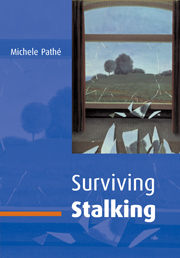Book contents
- Frontmatter
- Contents
- Acknowledgments
- Introduction
- 1 What is stalking?
- 2 How common is stalking?
- 3 Who stalks?
- 4 Could I be assaulted?
- 5 Can stalkers be treated?
- 6 Who are the victims of stalking?
- 7 The impact of stalking
- 8 Reducing your chances of victimization
- 9 Evading the stalker
- 10 Navigating the criminal justice system in the United States of America
- 11 Navigating the criminal justice system in the United Kingdom
- 12 Navigating the criminal justice system in Australia
- 13 Should I just disappear?
- 14 How do I deal with the emotional impact of stalking?
- 15 How you can assist victims of stalking
- Conclusions
- References
- Reading guide
- Appendix 1 Other resources
- Appendix 2 Protection from Harassment Act 1997
- Appendix 3 Sample restraining order under Protection from Harassment Act 1997
- Appendix 4 Criminal justice system flow chart, UK
- Index
2 - How common is stalking?
Published online by Cambridge University Press: 04 September 2009
- Frontmatter
- Contents
- Acknowledgments
- Introduction
- 1 What is stalking?
- 2 How common is stalking?
- 3 Who stalks?
- 4 Could I be assaulted?
- 5 Can stalkers be treated?
- 6 Who are the victims of stalking?
- 7 The impact of stalking
- 8 Reducing your chances of victimization
- 9 Evading the stalker
- 10 Navigating the criminal justice system in the United States of America
- 11 Navigating the criminal justice system in the United Kingdom
- 12 Navigating the criminal justice system in Australia
- 13 Should I just disappear?
- 14 How do I deal with the emotional impact of stalking?
- 15 How you can assist victims of stalking
- Conclusions
- References
- Reading guide
- Appendix 1 Other resources
- Appendix 2 Protection from Harassment Act 1997
- Appendix 3 Sample restraining order under Protection from Harassment Act 1997
- Appendix 4 Criminal justice system flow chart, UK
- Index
Summary
The prevalence of stalking depends on how we define it. For instance, stalking defined as any unwanted contact will be a far more common experience than a definition confining it to specific patterns of repeatedly intrusive behaviours which evoke fear. It is also dependent on the sample in which stalking prevalence is being measured. One might expect rates of stalking to be higher when the group studied is comprised of victims of domestic violence compared with a sample of the community chosen at random.
‘Prevalence’ refers to the proportion of the population who, at a given time, have the experience in question. To date, studies of the prevalence of stalking have essentially been studies of the prevalence of victims' reports of being stalked. Stalkers seldom disclose their behaviours when surveyed, assurances of anonymity notwithstanding. (This is perhaps a reflection of the poor insight of some stalkers into the impact of their activities as much as any deliberate evasion; more on that in Chapter 3).
There are remarkably few published studies that have examined the prevalence and nature of stalking in the community. The first of these was conducted in Australia in 1996 by the Australian Bureau of Statistics (ABS) (Australian Bureau of Statistics, 1996). This was a national survey of women's broader experiences of physical and sexual violence, and it included questions related to stalking and harassment.
- Type
- Chapter
- Information
- Surviving Stalking , pp. 15 - 18Publisher: Cambridge University PressPrint publication year: 2002



